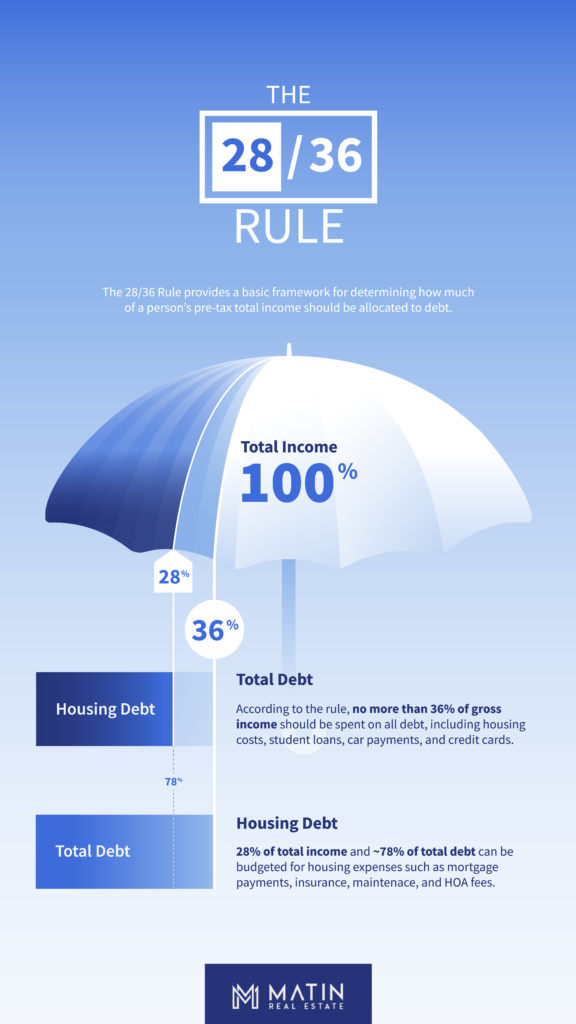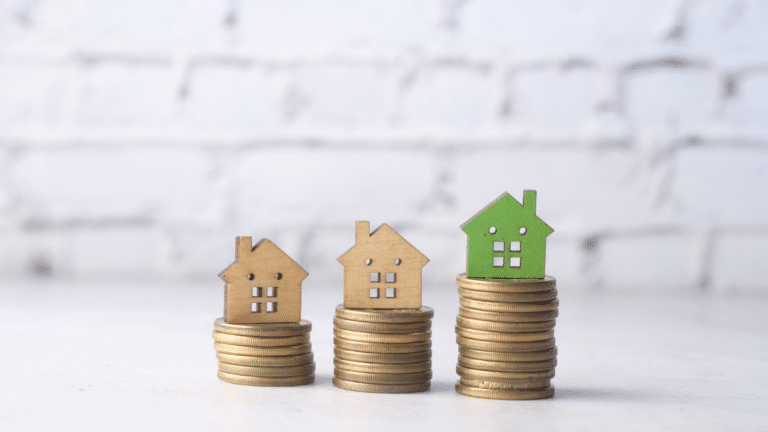For most people, purchasing a home is the most significant financial commitment they will make in their lives. Unfortunately, making such an important decision makes it easy to feel overwhelmed and unsure of what steps to take. Although there are many factors to consider, the most crucial factor is whether you can afford it.
As a general rule of thumb, we all know that you should not buy a house you cannot afford. So, when looking for a home, you should look for a home that fits your existing income or calculate how much money you will need to finance the house you desire.
Ultimately, being honest with yourself on your current financial position will allow you to live life comfortably without sacrificing other financial obligations.
This blog post will discuss how much of your income you should devote to your mortgage payments based on different factors such as debt-to-income (DTI) ratios, down payments, and other costs associated with homeownership.
The Recommended Percentage of Income for a Mortgage Payment

People may be in the same ocean but not in the same boat. Although people’s circumstances differ, there are at least two models on how much of your monthly gross income should go toward your mortgage: the 28% and 36% models.
The 28% Model
Many borrowers follow the 28% model. This model states that you should spend no more than 28% of your gross income, including principal, interest, taxes, and insurance, on your monthly mortgage payment.
Borrowers with incomes within 28% have historically been able to afford their monthly mortgage payments comfortably. Notably, the focus of the 28% cap is the front-end ratio or the borrower’s entire housing costs compared to their income. This ratio doesn’t consider any other monthly debt obligations like student loans, credit cards, and car payments.
The 36% Model
The 36% model takes a more holistic approach by factoring in all of a borrower’s monthly debts, not just their housing costs. This means that your total debt payments should not exceed 36% of your gross monthly income.
Potential lenders are very interested in how much money you spend vs. how much money you make. This ratio is referred to as your Debt-to-Income Ratio (DTI).
Lenders prefer to see a debt-to-income ratio of less than 36% of gross monthly income. Thus, you might want to keep track of your total monthly debt payments, which include but are not limited to:
- Auto Loans or Car Loans Payments
- Credit Cards Payments
- Homeowners Insurance
- Monthly Homeowners’ Association Fees
- Home Equity Loan
- Student Loans Payments
- Rent or Monthly Mortgage Payment
The 35% And 45% Model
Aside from these two, the 35% and 45% models also exist. This model states that your monthly mortgage payment should not exceed 35% of your pre-tax income or 45% of your after-tax income.
If you’re wondering which model to follow, most experts recommend that you follow the 28% rule. However, the other models also help you gain a holistic picture of your financial standing.
What Do Lenders Care About When Giving Loans?
Now that you know the different models, you might be wondering how much weight lenders give to these ratios.
The answer is: it depends.
There is no one-size-fits-all answer to this question since each lender has its lending criteria. However, lenders will look at much more than just your income when deciding whether or not to give you a loan.
Other important factors that lenders will consider:
- Credit Score: When determining how much you can afford, lenders consider your credit score. The higher your credit score, the lower your interest rate, affecting how much you can spend on a property.
- Your Employment History: Before getting a loan, you will need to produce proof of employment, such as a pay stub, for the past two years when you apply for a loan. Moreover, you will most likely be required to show tax returns, credit reports, and other company records if you work for yourself.
- Gross Income: Lenders will also want to look at your gross income. Your gross income is the sum of your earnings before taxes and other deductions. Gross income also includes spousal support, a pension, and rental income.
- DTI Ratio: The DTI ratio is calculated by dividing your monthly debt commitments by your total gross income. Lenders will be hesitant to give you a loan if you have multiple other debt obligations.
What is the Recommended Amount of Savings Before Buying a House?
Knowing how much money you will need to save to buy a house can be difficult. For instance, you can buy a property for a few thousand dollars in some circumstances, but you might be required much more in others.
It is better to put down 20% of the home purchase price range to avoid paying Private Mortgage Insurance (PMI). PMI usually gets included in your mortgage payments, and for every $100,000 borrowed, it can add $30 to $70 to your monthly mortgage payment.
Contrary to conventional loans, some government-sponsored mortgages require a lower down payment. For example, FHA loans require a 3.5% down payment for first-time homebuyers.
A home affordability calculator can help you calculate your monthly house payment, including principal, interest, property taxes, and insurance. To understand how your monthly payment would vary, try changing the home price, down payment, loan conditions, and interest rate.
Having An Emergency Fund
Furthermore, if you plan on putting a down payment on a home, you should also have an emergency fund. Emergency funds provide a financial cushion that can hold you up in a pinch without requiring you to use credit card payments or take out high-interest loans. Having an emergency fund is crucial, especially if you already have significant personal loans.
Most banks and financial experts recommend putting aside at least three months of living expenses in your emergency fund. That way, if you lose your job or have an unexpected expense, you can avoid the stress and worries associated with the issue without taking out a high-interest loan. However, the amount you put in your emergency fund can vary depending on your choices and financial situation.
To figure out how much you should save in your emergency fund, begin by calculating your monthly living expenses. Your emergency fund should include your mortgage or rent, energy bills, groceries, transportation costs, etc. Once you have your total monthly living expenses calculated, multiply that number by three to find out your minimum emergency fund. It’s also never a bad idea to expand your emergency fund to six months’ living expenses for more secure financials.
If you live in a two-income household, both household income earners are unlikely to lose employment simultaneously. So, you can likely rely on the salary of one income should an unexpected change in employment occur. Moreover, you may get by at the minimum if you have insurance coverage covering unexpected situations.
However, the point remains: Everyone experiences an unexpected expense or change in employment at some point in their life, so prepare for the unexpected with an emergency fund.
Three Ways to Save Money on Your Mortgage
A smaller mortgage payment is always desirable for any homebuyer. So, here are some tips for lowering your mortgage expenses:
Improve your Credit Score
Low credit scores result in higher interest rates. On the other hand, higher credit scores are more likely to qualify for a lower interest rate.
Paying your debt obligations on time is the best way to increase your credit score. Pay all of your monthly payments on any debt you have, and keep your overall balance low on each of your credit accounts to improve your credit score.
Pay Points Upfront
Often considered as “buying the rate down,” mortgage points are payments paid to mortgage lenders to reduce the loan’s interest rate.
Each point usually reduces the rate by 0.25%, so one point would reduce a 4% mortgage rate to 3.75% over the life of the loan. However, the amount that each point decreases the rate differs by the lender. Moreover, the ability of mortgage points to reduce interest rates is also dependent on the type of loan and the overall interest rate situation.
Refinance your Mortgage
Consider refinancing your mortgage if interest rates have recently been reduced. Reduced interest rates may result in lower monthly housing payments. You can check out this tool on FRED to see current 30-year mortgage rates.
The Benefits of Homeownership
Even though it is a significant commitment, purchasing your own home can provide a substantial return on your money. Here are some of the most notable advantages of homeownership:
Building Equity
The amount left over after subtracting the amount you owe on your home loan from the total worth of your home is your home equity — the monetary value of your home that you effectively own.
Paying your mortgage is thus a sort of savings in that it grows your home equity, which you may be able to access in the future if you ever need funds. If necessary, you can use how much home equity you have to cover a range of financial demands, such as home improvements, schooling, or medical bills.
Getting Tax Deductions
Often, you can reduce your income taxes if you own a house.
Under some conditions, your mortgage rates, property tax payments, and numerous state taxes may be deductible. In addition, specific loan discount points and closing costs may also be tax-deductible.
These potential tax deductions can put a large amount of money back in your pocket during the early years of your mortgage when interest makes up the majority of your monthly mortgage payments.
Owning Your Dream Home
Without approval from landlords, homeownership gives you the freedom to design the living space you have always imagined. You can have pets, paint rooms any color you like, alter the floors and carpeting and do virtually anything else to turn your house into your home.
Key Takeaway
Every dream takes considerable time, effort, and resources to become a reality. Before you take hold of the keys to your dream home, be sure that this is a commitment you are willing to undertake for the upcoming years of your life. You can work with your mortgage broker or lender or even check with government enterprises such as Fannie Mae and Freddie Mac to calculate your suitability.
Buying your own home is one way to enjoy the comforts of life. So, may you never let the mismanagement of your finances get in the way of the comfortable life you deserve inside your own home.


